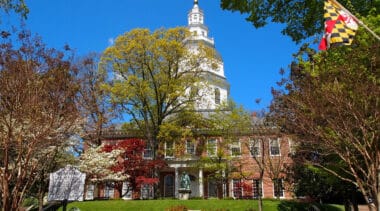Backgrounders
View all policy studies.-
Transportation revenue options in Maryland
Maryland needs to replace the fuel tax with a new more sustainable revenue source.
-
The Florida Retirement System’s proposed cost-of-living adjustment comes with major costs and risks
The cost-of-living adjustment proposed in Florida House Bill 945 could cost taxpayers over $47 billion over 30 years.
-
House Bill 78 exposes Alaska to significant additional costs
This bill could realistically add $11.4 billion in additional costs to future state budgets and reintroduce Alaska to significant pension risk.
-
Arizona Senate Bill 1365 threatens higher taxpayer costs and pension risks
Arizona Public Safety Personnel Retirement System Tier 3 reform is working. Senate Bill 1365 would fundamentally alter the current system.
-
Legalizing psilocybin access in Arizona would benefit mental health
Arizona Senate Bill 1555 would create a regulatory framework for limited, legal access to therapeutic psilocybin services.
-
Delaware Senate Bill 46 would ban autonomous vehicles
Automated vehicle technology under development could greatly improve road safety and efficiency.
-
Tennessee Senate Bill 310 would prohibit driverless vehicles
Automated vehicle technology could greatly improve road safety and efficiency.
-
An overview of Ohio’s open enrollment policies
Ohio gets a grade of "F" in Reason Foundation's report evaluating each state’s open enrollment laws in seven critical areas.
-
An overview of Missouri’s open enrollment policies
Missouri gets a grade of "F" in Reason Foundation's report evaluating each state’s open enrollment laws in seven critical areas.
-
An overview of Mississippi’s open enrollment policies
Mississippi gets a grade of "F" in Reason Foundation's report evaluating each state’s open enrollment laws in seven critical areas.
-
Psychedelic drug policy recommendations for the incoming Trump administration
The incoming Trump administration has promised sweeping reforms, and that might include reversing the federal suppression of psychedelics.
-
Rent control implications and policy alternatives
Seven states currently have rent control laws, and 20 states introduced bills related to rent control in 2024.
-
Georgia’s teacher pension system needs reforms to address current debt, future risks
The pension plan is still $27.7 billion short on the assets needed to pay for retirement promises made to teachers.
-
State taxpayers’ share of MPSERS debt would increase under various proposals
The first 20.96% of each year’s unfunded accrued liability contribution is currently paid by local school districts, and any amount required above that is paid by the state.
-
Michigan requires greater transparency to support public trust in law enforcement
Michigan House Bill 5749 would clarify that law enforcement disciplinary records are not exempted from public records requests.
-
Delaying Mississippi PERS reform will increase cost to taxpayers
PERS faces a $25.5 billion shortfall largely due to unfunded benefit increases, investment underperformance, and insufficient employer contributions.
-
Regulated psilocybin access in Arizona would help treat mental health conditions
Arizona Senate Bill 1570 would create a regulated and limited program to access psilocybin.
-
Senate Bill 88 would expose Alaska to significant additional costs
This bill could realistically add $9.6 billion in additional costs to future state budgets and reintroduce Alaska to significant pension risk.

















